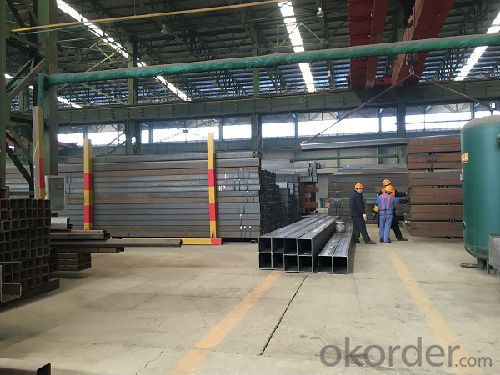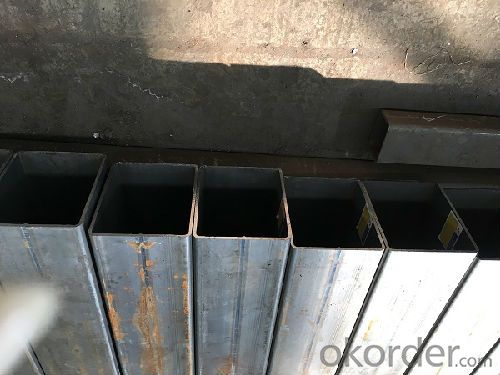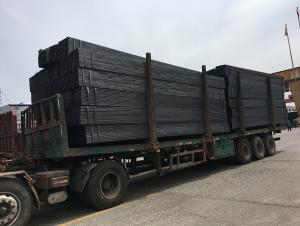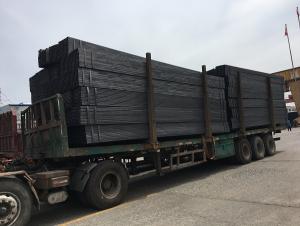Welded square tube for building structure
- Loading Port:
- Tianjin
- Payment Terms:
- TT or LC
- Min Order Qty:
- 15 m.t.
- Supply Capability:
- 15000 m.t./month
OKorder Service Pledge
OKorder Financial Service
You Might Also Like
1、Structure of Welded square tube for building structure
Square tube, square tube is a kind of call and rectangular tube, is equal and not equal to the length of steel pipe. Is the strip through the process of processing roll system. In general is the strip through the demolition of the package, flat, curly, welded to form a circular tube, and then rolled into a square tube and then cut into a square tube and then cut into the required length.
2、Main Features of Welded square tube for building structure
• High manufacturing accuracy
• High strength
• Small inertia resistance
• Strong heat dissipation ability
• Good visual effect
• Reasonable price
3、 Welded square tube for building structure Specification:
Standard | GB, DIN, ASTM |
Grade | 10#-45#, 16Mn 10#, 20#, 45#, 16Mn |
Thickness | 1.5 - 25 mm |
Section Shape | Square and rectangular |
Outer Diameter | 20*20 mm-------400*400mm 20*30mm*300*500mm |
Place of Origin | Tianjin, China (Mainland) |
Length | 3-12M |
Outer Diameter | 20*20 mm-------400*400mm 20*30mm*300*500mm |
Grade | 235B 345B |
Standard | ASME, ASTM |
1) Material:(ASTM A 106/A53 GRB.API5LGRB,GB,235B,345B
2) Specification range:OD: 20*30mm----300*500mm 20*20 mm---400*400mm ,WT: 1.5 - 25 mm ,length:3-12m or according to the requirement of clients.
3) Excutive standards:GB,ASME API5L.ASTM A 106/A53,Despite of the above
4) Surface:black lacquered,varnish coating or galvanized.
5) Ends:Beveled or square cut ,painted.
6) Packing:bundles wrapped with strong steel strip,seaworthy packing.
4、Packaging & Delivery
Packaging Details: | seaworthy package,bundles wrapped with strong steel strip |
Delivery Detail: | 15-30days after received 30%TT |
5、FAQ of Welded square tube for building structure :
①How is the quality of your products?
Our products are manufactured strictly according to national and internaional standard, and we take a test
on every pipe before delivered out. If you want see our quality certifications and all kinds of testing report, please just ask us for it.
Guaranteed: If products’ quality don’t accord to discription as we give or the promise before you place order, we promise 100% refund.
②How about price?
Yes, we are factory and be able to give you lowest price below market one, and we have a policy that “ for saving time and absolutely honest business attitude, we quote as lowest as possible for any customer, and discount can be given according to quantity”,if you like bargain and factory price is not low enough as you think, just don’t waste your time.Please trust the quotation we would give you, it is professional one.
③Why should you chose us?
Chose happens because of quality, then price, We can give you both.Additionally, we can also offer professional products inquiry, products knowledge train(for agents), smooth goods delivery, exellent customer solution proposals.Our service formula: good quality+good price+good service=customer’s trust
SGS test is available, customer inspection before shipping is welcome, third party inspection is no problem.
6、 Welded square tube for building structure Images:


- Q:Are steel pipes suitable for underground cable protection?
- Indeed, underground cable protection can be achieved through the use of steel pipes. These pipes boast remarkable durability and strength, rendering them an optimal choice for safeguarding cables against external elements such as physical harm, wetness, and corrosion. They are capable of enduring the soil's weight and any potential pressure from above, guaranteeing the cables' security and protection. Furthermore, steel pipes can be effortlessly welded or connected to establish a continuous and flawless conduit, thereby bolstering their efficacy in underground cable protection.
- Q:What are the different grades of steel used in pipe manufacturing?
- The different grades of steel used in pipe manufacturing vary depending on the intended use and specific requirements. Some common grades include carbon steel (such as ASTM A106 or API 5L), alloy steel (such as ASTM A335), stainless steel (such as ASTM A312), and duplex steel (such as ASTM A790). These grades have different chemical compositions and mechanical properties to suit various applications in industries like oil and gas, construction, and plumbing.
- Q:How do you calculate the pipe volume for steel pipes?
- To calculate the pipe volume for steel pipes, you can use the formula V = πr^2h, where V represents volume, π is a mathematical constant (approximately 3.14159), r is the radius of the pipe, and h is the height or length of the pipe.
- Q:What is the difference between internal and external coating for steel pipes?
- A protective layer is applied to the inner surface of steel pipes, which is known as internal coating. The main purpose of this coating is to prevent corrosion and enhance resistance against chemicals present in the fluid being transported. Techniques like spraying, brushing, or dipping are commonly used to apply the internal coating, and it can be made of materials such as epoxy, polyurethane, or cement mortar. On the contrary, external coating involves the application of a protective layer on the outer surface of steel pipes. The main objective of this coating is to protect against environmental factors like corrosion, abrasion, and impact. External coatings are usually applied through methods like wrapping or coating with materials such as polyethylene, fusion-bonded epoxy, or asphalt enamel. To summarize, the primary difference between internal and external coating for steel pipes lies in their location and purpose. Internal coatings safeguard the inner surface from corrosion and chemical attacks, while external coatings provide protection against environmental damage on the outer surface. Both types of coatings are essential to ensure the durability and reliability of steel pipes in various applications.
- Q:How are steel pipes inspected for defects?
- Steel pipes are inspected for defects using various methods, including visual inspection, ultrasonic testing, magnetic particle inspection, dye penetrant testing, and radiographic examination. These techniques help identify any cracks, corrosion, or other defects in the pipes to ensure their structural integrity and prevent any potential hazards or failures.
- Q:How are steel pipes used in the construction of power transmission lines?
- Steel pipes are commonly used in the construction of power transmission lines as they provide a strong and durable structure to support the weight of the lines and withstand environmental conditions. These pipes serve as the main support structure for overhead power lines and are often used to elevate the lines above ground level or across bodies of water. Additionally, steel pipes are used to protect and encase underground power cables, ensuring their safety and longevity.
- Q:What are the different types of steel pipe fittings for chemical processing plants?
- There are various types of steel pipe fittings commonly used in chemical processing plants, such as elbows, tees, reducers, couplings, flanges, and valves. These fittings are designed to connect and redirect the flow of fluids within the piping system, ensuring efficient and safe operation in chemical processing applications.
- Q:What are the different types of supports used for steel pipes?
- Some common types of supports used for steel pipes include pipe hangers, pipe clamps, pipe saddles, and pipe shoes. These supports are designed to provide stability, prevent movement, and distribute the weight of the pipes, ensuring they are properly supported and protected.
- Q:Can steel pipes be used for underground stormwater systems?
- Indeed, underground stormwater systems can utilize steel pipes. Renowned for their resilience and robustness, steel pipes are apt for enduring the pressure and burden of such systems. Furthermore, steel pipes possess remarkable resistance against corrosion, a crucial attribute when handling stormwater potentially laden with diverse pollutants. Nevertheless, it is imperative to adequately coat and safeguard the steel pipes to avert any potential corrosion or harm over time. Routine maintenance and inspections should also be undertaken to guarantee the integrity of the steel pipes and the overall efficacy of the underground stormwater system.
- Q:Where is a steel pipe casing usually used?
- A straight tube of carbon steel sheathed on pipes and tubes and threading tubes to protect the joints from damage by electric welding. The purpose is to protect the wires and cables.
1. Manufacturer Overview |
|
|---|---|
| Location | |
| Year Established | |
| Annual Output Value | |
| Main Markets | |
| Company Certifications | |
2. Manufacturer Certificates |
|
|---|---|
| a) Certification Name | |
| Range | |
| Reference | |
| Validity Period | |
3. Manufacturer Capability |
|
|---|---|
| a)Trade Capacity | |
| Nearest Port | |
| Export Percentage | |
| No.of Employees in Trade Department | |
| Language Spoken: | |
| b)Factory Information | |
| Factory Size: | |
| No. of Production Lines | |
| Contract Manufacturing | |
| Product Price Range | |
Send your message to us
Welded square tube for building structure
- Loading Port:
- Tianjin
- Payment Terms:
- TT or LC
- Min Order Qty:
- 15 m.t.
- Supply Capability:
- 15000 m.t./month
OKorder Service Pledge
OKorder Financial Service
Similar products
New products
Hot products
Related keywords































